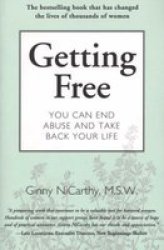Description
This excerpt from "Getting Free: You Can End Abuse and Take Back Your Life" by Ginny NiCarthy discusses the book's importance and how it has been helpful to many women. The book is written in an accessible style and is packed with practical information and answers to common questions about domestic violence. NiCarthy features important new information from the latest studies and most recent research on the subject in this updated edition. New chapters cover a variety of relevant issues, including research on battered children, the cultural and legal issues relevant to immigrant women, and a presentation of how religious beliefs and religious communities affect the real and perceived choices of women facing violence.
Since its original publication in 1982,
Getting Free has become a best seller and the most important self-help book on ending domestic violence. Written in an accessible style, packed with practical information and answers, special exercises designed to help a woman recognize abuse, and several success stories, Getting Free remains an important resource today-and this updated edition makes it an all the more relevant resource. In this expanded edition, Ginny NiCarthy features important new information from the latest studies and most recent research on the subject. New chapters deal with a variety of relevant issues including research on battered children; the cultural and legal issues relevant to immigrant women; and a presentation of how religious beliefs and religious communities affect the real and perceived choices of women facing violence.
Although Getting Free was written in 1982, it is still called the bible of all domestic violence texts. It's not just the content of the book--twenty-four chapters covering a gamut of issues--but the tone. The problems of and solutions to domestic violence are clearly defined through the voices of women as they share their experiences and carve out their steps toward freedom. Each chapter discusses a different phase in the experience of "getting free" and the problems surrounding each phase. Readers can reach for this book to look up specific domestic abuse issues or they can read it straight through. There is much to learn here--the history of battering as a phenomenon; the political and social aspects of abuse; the historical changes to the institutions of marriage and family, and more. Chapter 4, "What Do You Owe Yourself?," helps women work toward a healthy autonomy and defines what each partner in a relationship deserves. Discussion on the unconscious expectations of marriage and romance segues into practical advice on the economics of single life. When reaching for Getting Free in crisis, readers might begin with Chapter 6, "Making the Decision," or Chapter 14, which argues for and against moving to a shelter. There is wise and compassionate counsel for the loneliness that can ensue from fleeing an abusive relationship. At the time that Getting Free was first published, the more common feeling about domestic abuse was that women brought it on themselves. This landmark book changed that perception, not only bringing a pandemic social problem to light, but also offering a lifeline to thousands of women. It continues to do so.
